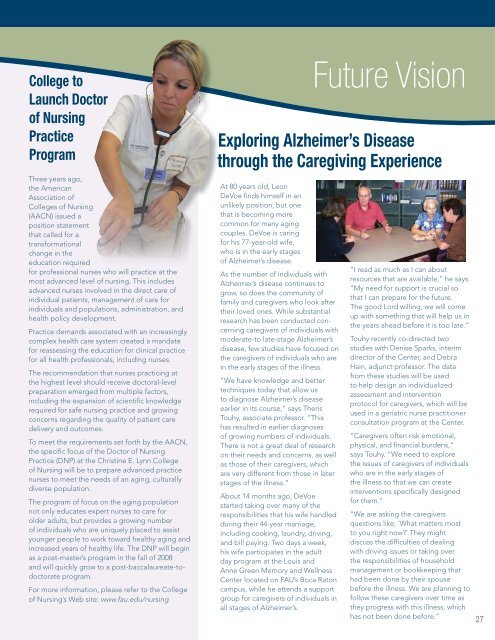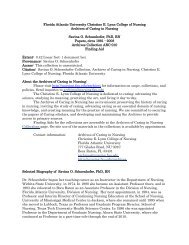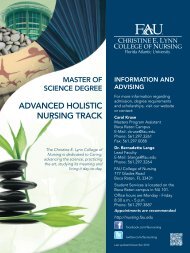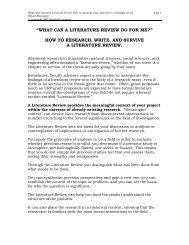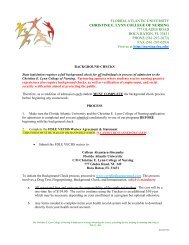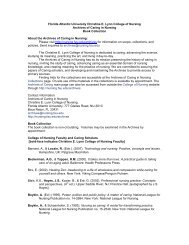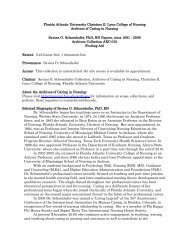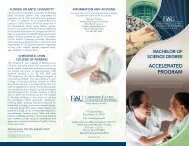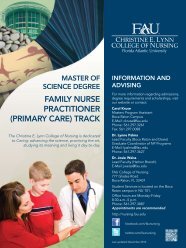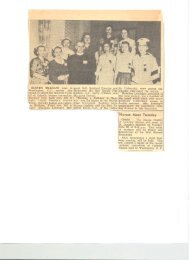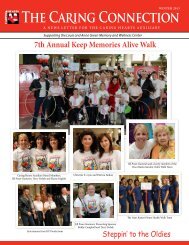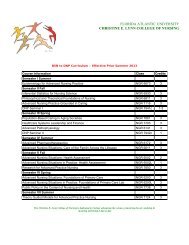transforming - Christine E. Lynn College of Nursing - Florida Atlantic ...
transforming - Christine E. Lynn College of Nursing - Florida Atlantic ...
transforming - Christine E. Lynn College of Nursing - Florida Atlantic ...
You also want an ePaper? Increase the reach of your titles
YUMPU automatically turns print PDFs into web optimized ePapers that Google loves.
<strong>College</strong> to<br />
Launch Doctor<br />
<strong>of</strong> <strong>Nursing</strong><br />
Practice<br />
Program<br />
Three years ago,<br />
the American<br />
Association <strong>of</strong><br />
<strong>College</strong>s <strong>of</strong> <strong>Nursing</strong><br />
(AACN) issued a<br />
position statement<br />
that called for a<br />
transformational<br />
change in the<br />
education required<br />
for pr<strong>of</strong>essional nurses who will practice at the<br />
most advanced level <strong>of</strong> nursing. This includes<br />
advanced nurses involved in the direct care <strong>of</strong><br />
individual patients, management <strong>of</strong> care for<br />
individuals and populations, administration, and<br />
health policy development.<br />
Practice demands associated with an increasingly<br />
complex health care system created a mandate<br />
for reassessing the education for clinical practice<br />
for all health pr<strong>of</strong>essionals, including nurses.<br />
The recommendation that nurses practicing at<br />
the highest level should receive doctoral-level<br />
preparation emerged from multiple factors,<br />
including the expansion <strong>of</strong> scientific knowledge<br />
required for safe nursing practice and growing<br />
concerns regarding the quality <strong>of</strong> patient care<br />
delivery and outcomes.<br />
To meet the requirements set forth by the AACN,<br />
the specific focus <strong>of</strong> the Doctor <strong>of</strong> <strong>Nursing</strong><br />
Practice (DNP) at the <strong>Christine</strong> E. <strong>Lynn</strong> <strong>College</strong><br />
<strong>of</strong> <strong>Nursing</strong> will be to prepare advanced practice<br />
nurses to meet the needs <strong>of</strong> an aging, culturally<br />
diverse population.<br />
The program <strong>of</strong> focus on the aging population<br />
not only educates expert nurses to care for<br />
older adults, but provides a growing number<br />
<strong>of</strong> individuals who are uniquely placed to assist<br />
younger people to work toward healthy aging and<br />
increased years <strong>of</strong> healthy life. The DNP will begin<br />
as a post-master’s program in the fall <strong>of</strong> 2008<br />
and will quickly grow to a post-baccalaureate-todoctorate<br />
program.<br />
For more information, please refer to the <strong>College</strong><br />
<strong>of</strong> <strong>Nursing</strong>’s Web site: www.fau.edu/nursing<br />
At 80 years old, Leon<br />
DeVoe finds himself in an<br />
unlikely position, but one<br />
that is becoming more<br />
common for many aging<br />
couples. DeVoe is caring<br />
for his 77-year-old wife,<br />
who is in the early stages<br />
<strong>of</strong> Alzheimer’s disease.<br />
As the number <strong>of</strong> individuals with<br />
Alzheimer’s disease continues to<br />
grow, so does the community <strong>of</strong><br />
family and caregivers who look after<br />
their loved ones. While substantial<br />
research has been conducted concerning<br />
caregivers <strong>of</strong> individuals with<br />
moderate-to late-stage Alzheimer’s<br />
disease, few studies have focused on<br />
the caregivers <strong>of</strong> individuals who are<br />
in the early stages <strong>of</strong> the illness.<br />
“We have knowledge and better<br />
techniques today that allow us<br />
to diagnose Alzheimer’s disease<br />
earlier in its course,” says Theris<br />
Touhy, associate pr<strong>of</strong>essor. “This<br />
has resulted in earlier diagnoses<br />
<strong>of</strong> growing numbers <strong>of</strong> individuals.<br />
There is not a great deal <strong>of</strong> research<br />
on their needs and concerns, as well<br />
as those <strong>of</strong> their caregivers, which<br />
are very different from those in later<br />
stages <strong>of</strong> the illness.”<br />
About 14 months ago, DeVoe<br />
started taking over many <strong>of</strong> the<br />
responsibilities that his wife handled<br />
during their 44-year marriage,<br />
including cooking, laundry, driving,<br />
and bill paying. Two days a week,<br />
his wife participates in the adult<br />
day program at the Louis and<br />
Anne Green Memory and Wellness<br />
Center located on FAU’s Boca Raton<br />
campus, while he attends a support<br />
group for caregivers <strong>of</strong> individuals in<br />
all stages <strong>of</strong> Alzheimer’s.<br />
Future Vision<br />
Exploring Alzheimer’s Disease<br />
through the Caregiving Experience<br />
“I read as much as I can about<br />
resources that are available,” he says.<br />
“My need for support is crucial so<br />
that I can prepare for the future.<br />
The good Lord willing, we will come<br />
up with something that will help us in<br />
the years ahead before it is too late.”<br />
Touhy recently co-directed two<br />
studies with Denise Sparks, interim<br />
director <strong>of</strong> the Center, and Debra<br />
Hain, adjunct pr<strong>of</strong>essor. The data<br />
from these studies will be used<br />
to help design an individualized<br />
assessment and intervention<br />
protocol for caregivers, which will be<br />
used in a geriatric nurse practitioner<br />
consultation program at the Center.<br />
“Caregivers <strong>of</strong>ten risk emotional,<br />
physical, and financial burdens,“<br />
says Touhy. “We need to explore<br />
the issues <strong>of</strong> caregivers <strong>of</strong> individuals<br />
who are in the early stages <strong>of</strong><br />
the illness so that we can create<br />
interventions specifically designed<br />
for them.”<br />
“We are asking the caregivers<br />
questions like, ‘What matters most<br />
to you right now’ They might<br />
discuss the difficulties <strong>of</strong> dealing<br />
with driving issues or taking over<br />
the responsibilities <strong>of</strong> household<br />
management or bookkeeping that<br />
had been done by their spouse<br />
before the illness. We are planning to<br />
follow these caregivers over time as<br />
they progress with this illness, which<br />
has not been done before.”<br />
27


